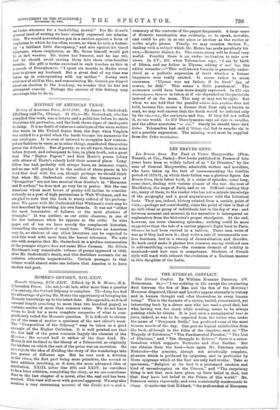HOMER'S ODYSSEY, XIII.-XXIV.
Homer's Odyssey, IIIL-IXTV. Edited by D. B. Monro, M.A. (Clarendon Press. 15s. net.)—At last, after more than a quarter of a century, the Oxford Odyssey is complete. The delay has had the advantage of giving Mr. Monro the opportunity of bringing his Homeric knowledge up to the latest date. His appendix, as it is of unusual length (reaching to more than two hundred pages), so contains matter of more than common value. We do not know where to look for a more complete conspectus of what is com- pendiously called the Homeric question. It is difficult to choose out of the mass of matter a specimen of the new editor's work. The "Composition of the Odyssey" may be taken as a good example of the Higher Criticism. It is well pointed out that the first half of the poem contains largely the element of the Miirchen; the second half is rather of the Saga kind. Mr. Monro is not inclined to the theory of a Telemaehid, as originally the nucleus on which the rest of the poem was an accretion. He also rejects the idea of dividing the story of the wanderings into two poems of different age. But he sees such a division in the vixen; the first part being more primitive, the second or later addition involving, as it does, the more advanced idea of retribution. XXIII. (after line 296) and XXIV. he considers to be a later addition, completing the story, as we see sometimes done in the last chapter of a novel, after the real end has been reached. This view will meet with general approval. We may also mention a very interesting account of the Cyclic Doets.. and a summary of the contents of the papyri fragments. A large mass of Homeric versification was evidently, so to speak, movable, and could be put in at one place or another as the reciter or scribe might please. Finally, we may mention Section V., dealing with a subject which Mr. Monro has made peculiarly his own,—Homeric dialect, &c. The commentary will be found very useful. Possibly there is an undue inclination to take new views. In XV., 267, when Telemachus says, "I am by birth of Ithaca, and my father is Ulysses, adding et TOT' gliV, the editor remarks :—" This well-known formula is generally under- stood as a pathetic expression of doubt whether a former happiness ever really existed. It seems rather to mean assurance. Ulysses was my father, if he lived' (as, of course, he did)." This seems a little paradoxical. The assurance could have been more simply expressed. In 275 rrir bereaeuclueros Ocivarov is taken as if rise depended on the participle instead of on the noun. This may or may not be right. But when we are told that the parallel voigroy Atbc eryd.sou does not hold, because this means a disease that Zeus only is known to send, we may well answer that the death would be inflicted only by the eav,—i.e., the tracrlyerrot and Prat. If they did not inflict it, no one would. In 272 Theoclymenus says Kat 1-yaw dK rarpflos, and the editor annotates "sc. def." Surely he should have said ihflor. Telemachus had said it Vamp- e(#1, but ix earpaos 41 is not a possible expression. The missing word must be supplied from the ixtiow wseedeepos.


























































 Previous page
Previous page